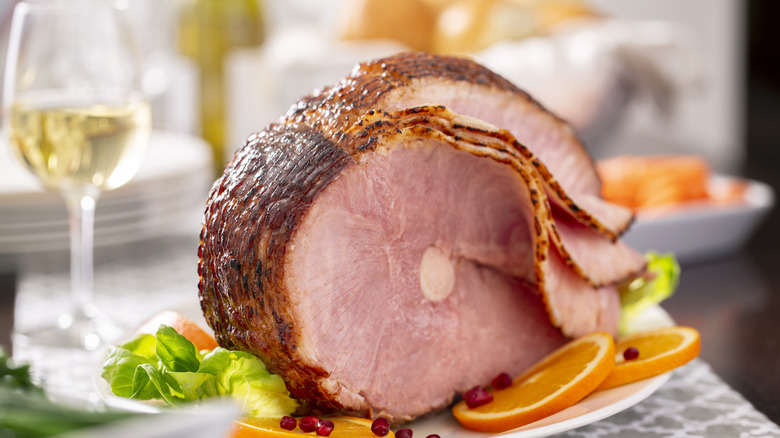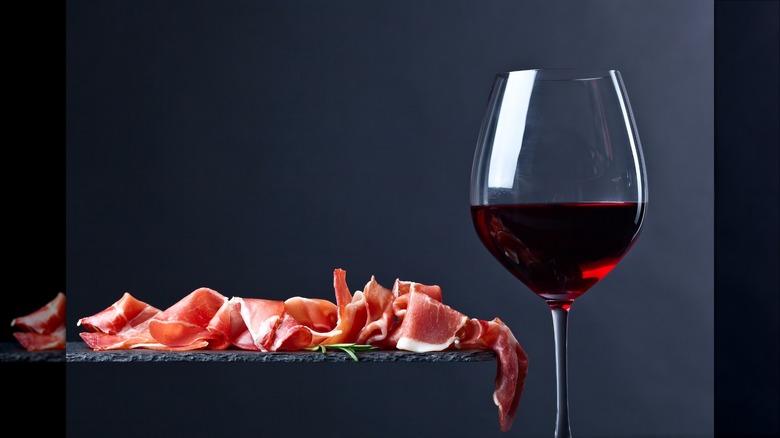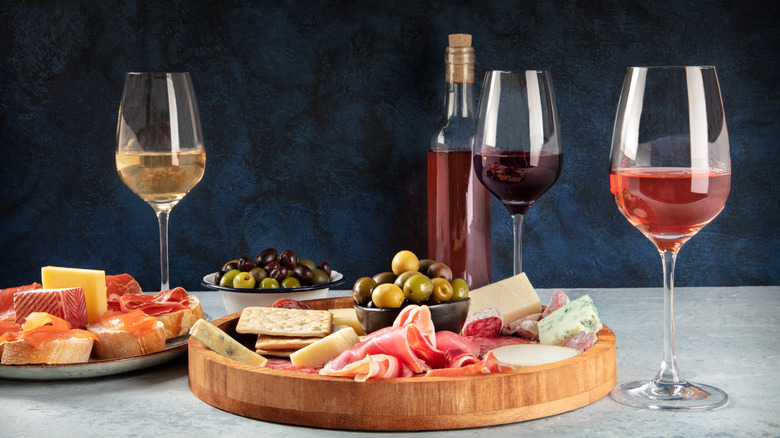The Best Wines To Pair With Ham
Whether you're pairing with a succulent Sunday spiral-cut ham or prosciutto-laden charcuterie board, you're bound to wonder which wine will go best with your spread. The salty and often sweet flavors of ham demand a thoughtful approach to your wine selection — a bold wine can overwhelm it and the wrong flavor profile might clash. The secret to a successful pairing lies in balancing and complementing the flavor of ham with wines that have a touch of sweetness, a light body, fruity notes, and a hint of acidity. With this in mind, you can't go wrong with classics like Pinot Noir, riesling, rosé, syrah, and most chardonnays with ham.
However, just as wines vary in sensory characteristics, so can ham. No, there aren't ham sommeliers (that we know of) at your local deli, but there are quite a few types of ham, as well as dishes that include them, each with unique flavor profiles. Understanding these nuances can help you pair any ham with a wine like an expert.
Ham's many flavors
Ham (a red meat, to the surprise of many) comes from the rear leg of a pig and can be served fresh and cooked (like a ham steak) or aged (like prosciutto). The preservation process includes a series of steps, starting with salting the ham and then drying and/or smoking it. Everything that happens along the way, from the type of wood used to smoke the ham to the curing time, affects the final product.
Ham can be broadly categorized into three main types: dry-cured and aged, smoked, or sweet. Since it cures over a long time, dry-cured, aged ham has a savory, concentrated flavor and has lower water content than other varieties. This category includes prosciutto, Bayonne, Serrano, and Ibérico ham, which you might find on a charcuterie board or pizza. Smoked ham is meatier and has more of a bold and smoky flavor — think non-glazed ham, black forest ham, and SPAM. On the sweet end of the spectrum is, well ... sweet ham, like Canadian bacon, honey ham, or glazed hams.
Wine pairings for every type of ham
Wine and food pairing is easier when you keep a few general guidelines in mind. Salty foods tend to go with acidic wines, while sweet ones go with lower-acid wines. Similarly, bold flavors work best with full-bodied wines and delicate with lighter-bodied wines.
When it comes to ham and wine pairings, ham type matters. Salty aged hams need the crispness, light body, and effervescence of pinot grigio, Chenin blanc, rosé, or sparkling wines. Smoked ham calls for wine with complimentary smoky notes and more body, with fruit notes and moderate acidity, like zinfandel, Sonoma Valley Pinot Noir, and Sangiovese. Sweet ham can stand up to sweeter wines, including riesling and Gewürztraminer. The only types of wine that don't pair well with ham are tannic reds, highly astringent white wines, or very oaky chardonnays, which can overpower ham's sweet and salty notes.
With this knowledge, countless delicious ham and wine pairings emerge. Imagine savoring a classic glazed ham on the holidays along with a crisp glass of riesling, or the unexpected delight of pairing a ham and pineapple pizza with a Kalimotxo (an effervescent combination of red wine and cola). French favorites like comforting jambon beurre sandwiches are also enhanced with the right wine, like French Bordeaux. Even Spam can play along, with Spam and rice pairing surprisingly well with Grenache Rosé. These inventive pairings show that even the simplest meals can be special with a bit of food knowledge.


